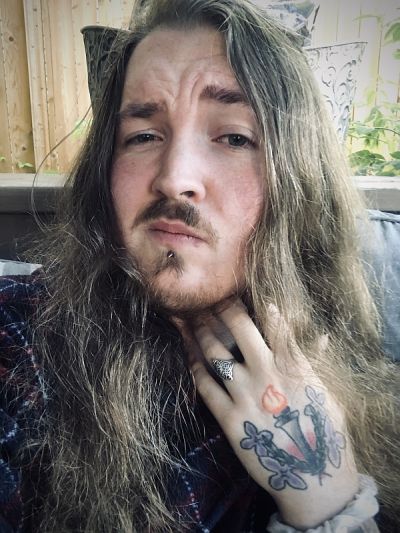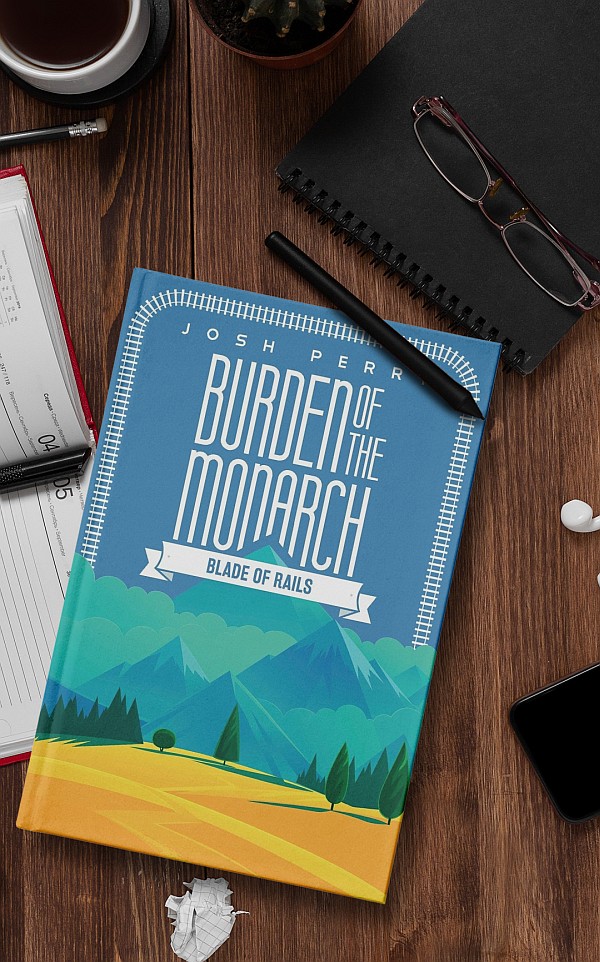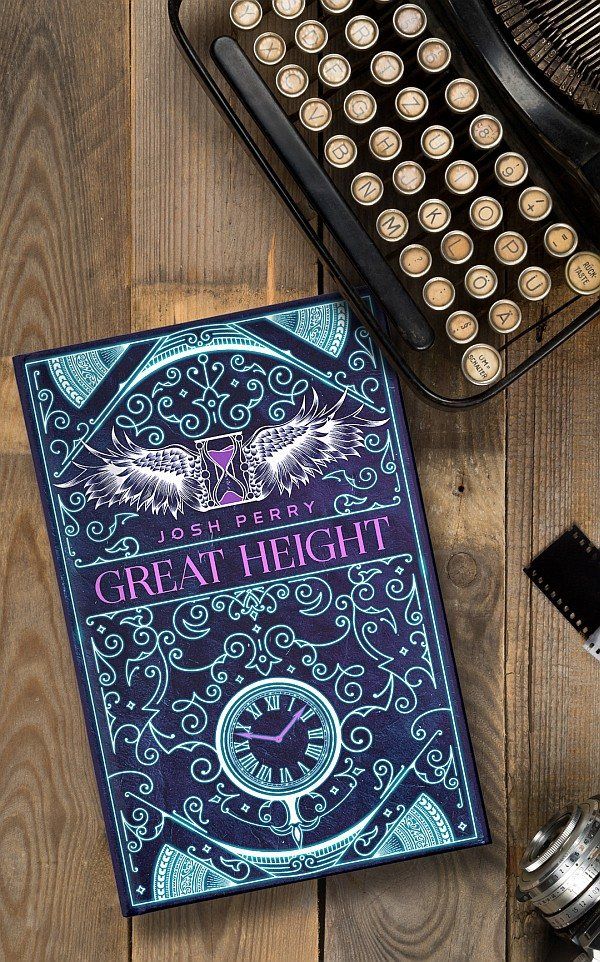- By Ana
- June 20, 2020
- 5:30 pm
Interview With Author Josh Perry
A lifelong fan of the fantasy genre, Josh Perry has published five novels so far, “Burden of the Monarch” and “Great Height” being his latest releases. I’m a huge fan of designing fantasy book covers, so when I heard “Great Height” is ready for publishing a few months ago, I just couldn’t wait to design the cover art.
Hi, I’m Ana Grigoriu-Voicu, book cover designer to independent and best selling authors all around the world. My focus lies on creating powerful visual stories for your published masterpieces. Via my blog I’m aiming towards providing you with the unique artistic perspective of someone who wants to turn each project into a best-seller. If you want to find out more about my work or you’d like to stay in contact, feel free to connect with me over Facebook, Instagram or e-mail.

You’ve published four fantasy books so far, one of which is freshly out of the printing press. Where do you find your inspiration in writing?
This is a question that I’ve always thought really hard about how to effectively answer. There are a thousand answers and then there is one I think everyone could recall by muscle memory even if it isn’t true for them. “It is just what I was born to do.” However that is really only the cliche, the surface cause.
At a very deep level I believe the world can be an amazing place and I am disappointed with what we have ended up with. I find it infuriating how ignorant people are of the potential for things to improve. For joy to be commonplace, for safety to be a given, for the world to be better. However I also understand that the impulse of that anger; to scream and rant and yell at people who don’t care. That that impulse just won’t help me or my cause. It won’t make what I believe in any more palatable or believable to someone who doesn’t think we can ultimately create a utopia. So in my writing, I write to make my version of the perfect world more understandable. I want to be able to showcase why I think we can do better, why I think we can ultimately make things work. So while my writing touches on multiple different elements and aspects of this process. It is all bound together by an inherent desire to be one of what will be thousands of educators whom prepare society for a transition into something better then what we currently have.
That being said, I don’t personally believe inspiration is the tool required to accomplish writing. Inspiration is fleeting, it is the first few sentences in a story, it is the choice to buy running shoes but not the will to actually go for a run. I love being inspired, and I love when that process or that elation brings to me a cool idea! But if I relied on it to actually write and go through and finish books? I might get a single project completed by the time I retire. So for me, what really motivates me is the satisfaction I feel knowing I did what I told myself I would.
Plus, I just find it fun!
How did you begin writing? What sparked your interest in becoming a writer?
I can actually remember the first time I really started writing. I would create single entry mini-encyclopedias for a single topic. So it would be something like “Cheetah” or “Obsidian” and then a picture of that thing, and a bunch of random notes and ‘facts’ about the item. They weren’t specifically fantastic nor was I ever a gifted visual artist. But what really sealed the deal for me, and what I remember even now very clearly. Was that at the start, I had no way of binding these books. So I would fold them in half and then use maybe string, or glue to keep them together. But it never looked right in my mind.
My preference was for a stapler to put the pages together so when they folded in half; either side created a page of a book. I asked constantly for a stapler until I’m pretty certain my dad just stole one from his office to give to me? Alongside a few boxes of additional staple refills. However once I had that and I could start putting together proper ‘books’; I was sold. There was nothing that ever felt as inherently amazing as creating something filled with words and being able to look at it.
Writing remained in my life moving forwards. I loved every narrative I could get my hands on. I loved the escapism. I liked that writing let me keep daydreams and make them better.
However there are tons of arts and ways to be expressive. Beyond creating books with a stolen stapler and escaping into a world of fantasy. I wanted to write so I could create the conversations I want to be having in real life. I wanted to satisfy the part of me that would love to carry an oversized sword and travel across a land with magic and mystery and villains. I started to write and continue to write to satisfy the part of myself that has to live in reality and hates it.

Burden of the Monarch is available for purchase at Lulu in e-book and paperback formats.
“Filled with magic, fantasy, subtle romance, and adventure, [“Burden of the Monarch”] hits a number of themes and motifs in one novel and culminates with a fantastic ending. “
– Self-Publishing Review, ★★★★
Are you a pantser or a plotter?
One hundred and ten percent a plotter. When I think about a story, I very infrequently start with the “elevator pitch” and go from there. What attracts me to any story is the sum of what it amounts to. When I describe my favourite movies I don’t describe the first few scenes or random character hooks. I describe the journey you go on and where you’ll be at the end of that experience. It is that end result that maintains in the mind.
This informs how I create a story or a plot. Very infrequently do I go from page one and work towards the end without knowing where that is intended to be. I work from the middle back, the second chapter to the end and all mixed between. To me the creation of what is ultimately some sort of 4d, warped, yet complete puzzle is the goal. To make it so the plot is realistic, that the start informs the end, that the end fulfills the start. I view a story or a book as a whole creation and as such there isn’t any part of it I could create without wanting to balance out the other side in tandem.
Just as well, I tend to think of things from the perspective of someone considering getting the book. While they can never really know how the book they’re going to purchase was created. I know myself, that I want to purchase well considered works. I want to own stories that someone cared enough about to polish, and challenge and construct intentionally. I want a story to know what it has to say and what it wants to accomplish from the first page and I don’t inherently believe writing by the seat of your pants lets you accomplish that as completely or entirely as constructing a plot first does.
That all being said. The distance between plot points is fulfilled by submersing myself fully in the plotted scene and then just describing what happens. It is through organizing perfect clarity in regards to what occurs and what changes as a result of that occurrence; that I can go through a scene knowing exactly what someone would say. Or know how to transition into the next scene and when to end a conversation. The plotting informs the inherently abstract portion of creation that needs to take place so the story can actually exist. The best comparison is walking on a single rope between two fixed locations; the start and end are clearly defined but you may wobble, skip or fall as required while you travel between them.
Do you outline the characters’ traits before starting to write the story or do you let them develop on their own as the story progresses?
A bit of both is most accurate. Early in my life I was really focused on psychology and went on to do some training in grief therapy. When I envision a character I think about not just their traits but multiple other defining characteristics such as:
- Their starting emotional state
- Their awareness of their own emotional state (internal emotional intelligence)
- Their motivation (why would they participate in this plot)
- Are they introverted/extroverted?
- If put in a room with no door, no windows but an infinite amount of things to do. What would this character do?
- Is this character afraid of dying/do they get anxious about their mortality (if they are mortal).
- Is the reader/audience intended to like this character?
- At the end of this story, where will they end up?
Once from that point the character is structured for introduction into the story. I basically just put them into the story and “let them loose”. I let the original construction inform their decisions and reactions. One of the most important things I’ve found in letting a character ‘develop themselves’ is to stop using half-assed descriptions for their traits. Something I did as a more inexperienced author was doing things like “The person responds sort of sarcastically” instead of just going “The person responds sarcastically”. Recognizing that the character is the character and they will consistently be themselves helps you just let them. This way as you give them challenges and obstacles, rewards and other changes through the plot their reactions only serve to further showcase who they truly are.
What part of the story do you find the easiest to write? How about the one that feels the hardest to bring together?
Certainly the dialogue. I study people in real life, I read a lot and I take in information from every facet of our world that I can. I’ll watch movies I think I’ll hate, listen to people who make no sense or engage in a conversation about very specific things just so that I can hear every variation of response possible. It is this, on top of independent empathy and character mapping that lets me go into a conversation between multiple fake people and fairly easily envision exactly how they would interact with each other.
Second to dialogue there are portions in any of my plots that I get really excited to write. It might be a certain set piece or a specific interaction between two entities. But often there is a part of a story that I just can’t wait to get into and do really well. I’ll obsess about the correct way to deliver a turn of events and it is legitimate joy to create those pages.
The most difficult part of a story is probably the second act. It is, in my opinion. Very easy to start a story and very easy to finish a story. These are definitive places, they are resolved destinations. The second act and the primary central bulk of a book has to do so much legitimate work. It is in this portion of the book a reader decides if they’re bored and ultimately if the writer is any good. If the middle of the book falls flat, or drops for even a few pages; someone might never get to the amazing and well constructed ending. They’ll recognize the next few hours of reading will be descriptions of random plates and tables they don’t care about, or the intricacies of some bureaucratic system and they’ll put the book down. Creating something that is engaging and keeps the person fascinated in the ultimate outcome before they can see it is the true challenge of writing a story or book.

Great Height is available for purchase at Lulu in e-book and paperback formats.
What about the heroes that became their own greatest quest and ascended to great height as a result? Valyrsus is a powerful wizard engaged as a professor of the prestigious University of Inwick. When a sudden crisis threatens the stability of magic of all its users across the globe; he is thrust into action alongside his colleagues to quell the existential threat and bring the world to a state of stability.
– Great Height
What do you think about the concept of writer’s block?
I don’t believe in it. Motivation is a skill not an emotion. The capability to make yourself accomplish something is not the luck of the draw, or the perfect coalescence of the wind, stars and natural energy of existence. At a very core level the only thing that finishes books is writing and finishing books. This is a process that involves actually doing the writing.
From my own point of view writer’s block is like admitting you’re out of creativity. I’ve seen it before where someone is defining their lack of creation as ‘writer’s block’ when instead, maybe, they just created everything they had in them to create. I don’t ever want to discourage anyone from writing. But if you want to approach creating stories and always doing so; you need the stories. You need to see a rock on the side of a road and a nearby broken fountain and have fourteen pages of lore for a short story appear in your head. You need to hear a whistle in the background and breeze near your fingers then start to fear the massive screeching creature behind you, then start considering how you’ll fight for your life.
If at the end of the day someone says they want to write. But they can’t sit down in front of the word processor or notebook or whatever and actually write. I think ‘writer’s block’ is just the phrase being used for “trying to make myself do something I don’t want to do.” Because I can promise that someone who wants to write, someone that wants to publish books, someone that has stories to tell; they just write the books. The only legitimate blockade to writing is time. If you have a life to manage, work to attend, bills to pay, bullets to dodge, etc. Then you can’t write as much as you want. The only real resource devoured by writing is time and effort; which you must have in amble (preferably excess) reserve.
What is your writing setup and do you have any kind of “writing ritual” to boost your inspiration?
I use a computer to write. Because of the way my brain works I just need things to be well organized and my own hand-writing is certainly not up to code. Just as well I like being able to freely edit things, scroll through various pages and perform on-the-fly management of the project as a whole which isn’t really an option when working on paper. So I have a nice chair, a monitor, keyboard/mouse. All of my books have been created digitally.
I like to give myself a designated period of time to write and create a peaceful environment for that time. I always start a session of writing by calming myself. Re-reading the past page or two of what I most recently did (editing as I go) and then I start my writing. From there I make sure I have a goal set for my writing session that I can keep in mind. Whether it is a certain amount of words or finishing off a chapter. Getting to that goal within the session is like an achievement.
What is the best piece of writing advice you’ve ever received?
I think I found the following quote, like many people; and it offered the required insight to become a persevering writer:
“Nobody tells this to people who are beginners, I wish someone told me. All of us who do creative work, we get into it because we have good taste. But there is this gap. For the first couple years you make stuff, it’s just not that good. It’s trying to be good, it has potential, but it’s not. But your taste, the thing that got you into the game, is still killer. And your taste is why your work disappoints you. A lot of people never get past this phase, they quit. Most people I know who do interesting, creative work went through years of this. We know our work doesn’t have this special thing that we want it to have. We all go through this. And if you are just starting out or you are still in this phase, you gotta know its normal and the most important thing you can do is do a lot of work. Put yourself on a deadline so that every week you will finish one story. It is only by going through a volume of work that you will close that gap, and your work will be as good as your ambitions. And I took longer to figure out how to do this than anyone I’ve ever met. It’s gonna take awhile. It’s normal to take awhile. You’ve just gotta fight your way through.”
― Ira Glass
What are you planning to work on next?
My next project will be the sequel to my current fantasy series “Burden of the Monarch”. The sequel will follow up the events from “Blade of Rails” and move into the central conflict of the series. I’m incredibly excited to work on this project and the only reason I ultimately postponed immediately working on the sequel to “Blade of Rails” was that I wanted to make sure that the sequel could follow up on all the strings put in place by the first novel. I have always had a big fear of writing a fulfilling sequel; almost to the point of having thought I would never do one.
Moving forwards into this project that is the central challenge. Not only to create something that adds to the original but is fulfilling and interesting on its own. Something I think would be amazing to do, but tough to execute is create each of the books in the “Burden of the Monarch” series to be independently interesting. So that if someone found one of them randomly in a pile of books at a thrift store that they would be persuaded to find out what happened in the other books; without being so lost it isn’t enjoyable to just read.
What are you currently reading?
Consider Phlebas, by Iain M. Banks
Where can we follow your work on social media?
I can be found on facebook at: www.facebook.com/JoshPerrytheauthor
Share this article:


